95 posts
Latest Posts by amandadiamond - Page 3
Get more confident
Becoming more confident is a long journey full of hard work. I’ve always had very low confidence but in the last few years I managed to become more confident than I ever imagined I’d be. Here are the things that helped me with my confidence the most:
Wake up with music that makes you feel good -Create a playlist of songs that make you feel alive and powerful and then listen to it every morning. If you aren’t waking up to Everybody loves me by OneRepublic… What are you even doing?
Stop being mean to yourself -So many of us call ourselves a disappointment on daily basis without realising it. I want you to imagine you are talking to a friend, not yourself. You wouldn’t call your friend useless every time they mess up, would ya?
Wear clothes you are comfortable in -I’m not necessarily talking physical comfort. You should feel beautiful in your clothes. It can be wearing sweatpants or croptops, it’s your choice!
Declutter your space -Throw away things that make you feel bad. All the clothes you don’t like wearing, all the clutter that makes you feel like crap at home. Even throwing away the shampoo that doesn’t smell nice to you is helpful.
Work out -Again it’s not as much about looking good but feeling good. You want to feel strong or fast or whatever your goal may be.
Appreciate small victories -A great journaling prompt is just to sit down every single evening and write down at least 3 small or big victories of the day.
Try new things -Get out of your comfort zone and try the things you’ve always wanted to do. For me personally it was talking to more poeple. I found more friends and realised I can make people laugh and that was a great confidence boost.
Walk with your head high -This is a sort of “fake it ‘til you make it” type of thing. Don’t look down when you walk and keep your back straight. Walk like an assassin on a mission.
Find what you’re good at -Get to know your talents.
Don’t rely on compliments from others -Learn to appreciate and compliment yourself.
Find what kind of vibes you want to have and work on that -Do you want to be a ray of sunshine? Smile more and wear bright colours. Become who you want to be.
Take care of your body -Force yourself to feel good in your skin.
Get familiar with your body -Stop avoiding mirrors. Find the things you love about it and accept things you don’t like. Be grateful for your body taking care of you the way it does.
As alwas I truly hope I helped at least some of you and have an amazing year full of self love!

Press Ctrl+F or ⌘F to do a quick search!
bookboon // for accounting, business, economics & finance, engineering, IT & programming, languages, marketing & law, natural sciences, statistics & mathematics (+ career & study advice, strategy & management)
booksee // for arts & photography, biographies & memoirs, business & investing, computers & internet, cooking, entertainment, health, history, home, law, literature & fiction, medicine, references, religion, science, sports, travel, and other categories
bookstacks // for popular classics
boundless // for accounting, algebra, art history, biology, business, calculus, chemistry, communications, computer science, economics, education, finance, management, marketing, microbiology, music, physics, physiology, political science, psychology, sociology, statistics, U.S. history, world history, writing
california learning resource network // for mathematics, science, history
ck-12 // for elementary math, arithmetic, measurement, algebra, geometry, probability, statistics, trigonometry, analysis, calculus, earth science, life science, physical science, biology, chemistry, physics, sat exam prep, engineering, technology, astronomy, english, history
college open textbook // for anthropology & archeology, art, biology & genetics, business, chemistry, computer science, economics, engineering & electronics, english & composition, health & nursing, history, languages & communication, law, literature, math, music, philosophy, physics, political science, psychology, science, sociology, statistics & probability
Keep reading







a quick guide to art journaling
[ don’t repost / claim as your own ]
self discipline tips
here are tips I discovered very recently:
something is better than nothing. 5 minutes of work are better than zero. Just because you missed something on your schedule doesn’t mean you can’t still work on it, even for 5 minutes. Grow and build on this.
second drafts / reviews can be done after.
Don’t think you are going to do your very best work on the first try. Take the weight of perfectionism off your shoulders.
don’t think about doing it. just do it as fast as you can.
build on your productivity, not your failures.
If you come from a past of procrastinating and now feel motivated to change and discipline yourself, do NOT try to do everything at once.
if you have a set of different goals to accomplish, begin with the most important one. Wait until the rotine of working for that one settles in (you feel productive and comfortable-ish), and then begin with the next. Repeat.
this way you’ll be building your way up and not juggling everything at the same time, hoping everything works out.
be patient with yourself, you’ll get there!
set smaller deadlines for your goals
have monthly and weekly-ish deadlines
e.g. if you are doing a project, due 22nd Feb, set personal deadlines, like have Introduction written by 2nd Feb, have Methods written by 10th Feb, have project complete by 18th Feb.
take them as seriously as you possibly can, don’t miss out on yourself.
write realistic daily tasks and don’t stop until you finish them. after them you can do whatever you want
on writing realistic daily tasks, the secret is knowing you can only do so much in one day, but trusting you can accomplish everything in the course of any period of time (a week, or 2 weeks or a month, etc.) because you will combine the work from all these different days.
it’s very tempting to write down all the tasks you need to accomplish in one day to just get over with it, but the real deal is you won’t accomplish half of them. You’ll feel very unproductive then, wich leads to demotivation.
spread daily tasks in the time necessary.
have a consistent sleep schedule.
if your mind isn’t ready everything will fall apart.
have one rest day per week where you plan nothing, do whatever you want except studying. this can be harder than you expect!
(don’t forget these are effective only if you actually put them into practice! good luck babes!!)
24 Invaluable Skills To Learn For Free Online This Year
Here’s an easy resolution: This stuff is all free as long as you have access to a computer, and the skills you learn will be invaluable in your career, and/or life in general.
1. Become awesome at Excel.
Chandoo is one of many gracious Excel experts who wants to share their knowledge with the world. Excel excellence is one of those skills that will improve your chances of getting a good job instantly, and it will continue to prove invaluable over the course of your career. What are you waiting for?
2. Learn how to code.
littleanimalgifs.tumblr.com
Perhaps no other skill you can learn for free online has as much potential to lead to a lucrative career. Want to build a site for your startup? Want to build the next big app? Want to get hired at a place like BuzzFeed? You should learn to code. There are a lot of places that offer free or cheap online coding tutorials, but I recommend Code Academy for their breadth and innovative program. If you want to try a more traditional route, Harvard offers its excellent Introduction to Computer Science course online for free.
3. Make a dynamic website.
You could use a pre-existing template or blogging service, or you could learn Ruby on Rails and probably change your life forever. Here’s an extremely helpful long list of free Ruby learning tools that includes everything from Rails for Zombies to Learn Ruby The Hard Way. Go! Ruby! Some basic programming experience, like one of the courses above, might be helpful (but not necessarily required if you’re patient with yourself).
4. Learn to make a mobile game.
If you’re not interested in coding anything other than fun game apps, you could trythis course from the University of Reading. It promises to teach you how to build a game in Java, even if you don’t have programming experience! If you want to make a truly great game, you might want to read/listen up on Game Theory first.
5. Start reading faster.
Spreeder is a free online program that will improve your reading skill and comprehension no matter how old you are. With enough practice, you could learn to double, triple, or even quadruple the speed at which you read passages currently, which is basically like adding years to your life.
6. Learn a language!
With Duolingo, you can learn Spanish, French, Portuguese, Italian, or English (from any of the above or more). There’s a mobile app and a website, and the extensive courses are completely free.
Full disclosure: BuzzFeed and other websites are in a partnership with DuoLingo, but they did not pay or ask for this placement.
7. Pickle your own vegetables.
Tired of your farmer’s market haul going bad before you use it all? Or do you just love tangy pickled veggies? You too can pickle like a pro thanks to SkillShare and Travis Grillo.
8. Improve your public speaking skills.
You can take the University of Washington’s Intro to Public Speaking for free online. Once you learn a few tricks of the trade, you’ll be able to go into situations like being asked to present at a company meeting or giving a presentation in class without nearly as much fear and loathing.
9. Get a basic handle of statistics.
UC Berkeley put a stats intro class on iTunes. Once you know how to understand the numbers yourself, you’ll never read a biased “news” article the same way again — 100% of authors of this post agree!
10. Understand basic psychology.
Knowing the basics of psych will bring context to your understanding of yourself, the dynamics of your family and friendships, what’s really going on with your coworkers, and the woes and wonders of society in general. Yale University has its Intro to Psychology lectures online for free.
11. Make your own music.
Step one: Learn how to play guitar: Justin Guitar is a fine and free place to start learning chords and the basic skills you’ll need to be able to play guitar — from there, it’s up to you, but once you know the basics, just looking up tabs for your favorite songs and learning them on your own is how many young guitar players get their start (plus it’s an excellent party trick).
Step two: A delightful free voice lesson from Berklee College Of Music.
Step three: Have you always thought you had an inner TSwift? Berklee College of Music offers an Introduction to Songwriting course completely for free online. The course is six weeks long, and by the end of the lesson you’ll have at least one completed song.
Step four: Lifehacker’s basics of music production will help you put it all together once you have the skills down! You’ll be recording your own music, ready to share with your valentine or the entire world, in no time!
12. Learn to negotiate.
Let Stanford’s Stan Christensen explain how to negotiate in business and your personal life, managing relationships for your personal gain and not letting yourself be steamrolled. There are a lot of football metaphors and it’s great.
13. Stop hating math.
If you struggled with math throughout school and now have trouble applying it in real-world situations when it crops up, try Saylor.org’s Real World Math course. It will reteach you basic math skills as they apply IRL. Very helpful!
14. Start drawing!
All kids draw — so why do we become so afraid of it as adults? Everyone should feel comfortable with a sketchbook and pencil, and sketching is a wonderful way to express your creativity. DrawSpace is a great place to start. (I also highly recommend the book Drawing on the Right Side of the Brain if you can drop a few dollars for a used copy.)
15. Make your own animated GIF.
BuzzFeed’s own Katie Notopoulos has a great, simple guide to making an animated GIF without Photoshop. This is all you need to be the king or queen of Tumblr or your favorite email chains.
16. Appreciate jazz.
reddit.com
Have you never really “gotten” jazz? If you want to be able to participate in conversations at fancy parties and/or just add some context to your appreciation of all music, try this free online course from UT Austin.
17. Write well.
Macalester College’s lecture series is excellent. If you’re more interested in journalism, try Wikiversity’s course selection.
18. Get better at using Photoshop.
Another invaluable skill that will get you places in your career, learning Photoshop can be as fun as watching the hilarious videos on You Suck At Photoshop or as serious as this extensive Udemy training course (focused on photo retouching).
19. Take decent pictures.
Lifehacker’s basics of photography might be a good place to start. Learn how your camera works, the basic of composition, and editing images in post-production. If you finish that and you’re not sure what to do next, here’s a short course on displaying and sharing your digital photographs.
20. Learn to knit.
Instructables has a great course by a woman who is herself an online-taught knitter. You’ll be making baby hats and cute scarves before this winter’s over!
21. Get started with investing in stocks.
If you are lucky enough to have a regular income, you should start learning about savings and investment now. Investopedia has a ton of online resources, including this free stocks basics course. Invest away!
22. Clean your house in a short amount of time.
Unf$#k Your Habitat has a great emergency cleaning guide for when your mother-in-law springs a surprise visit on you. While you’re over there, the entire blog is good for getting organized and clean in the long term, not just in “emergencies.” You’ll be happier for it.
23. Start practicing yoga.
Most cities have free community classes (try just searching Google or inquiring at your local yoga studio), or if you’re more comfortable trying yoga at home, YogaGlohas a great 15-day trial and Yome is a compendium of 100% free yoga videos. If you’re already familiar with basic yoga positions but you need an easy way to practice at home, I recommend YogaTailor’s free trial as well.
24. Tie your shoelaces more efficiently.
It’s simple and just imagine the minutes of your life you’ll save!

1.Learn the most common words of your target language first. The 300 most frequently used words represent about 65% of the words of a language and the 2000 most common give you about 90%. So there’s no point in wasting your time learning more complicated words when you begin your language learning journey.
2.Use flash cards! They’re simple and effective. What’s not to love? I suggest making digital flashcards because they’re quicker to make and you’d be able to use them anywhere.
3.Practice often. Learning vocabulary means being able to say and write the word as well as recognize the word when you see or hear it. So even after you’ve learned words, seek out opportunities where you can apply them in a real life setting. This means chatting in your target language online through video chat or text message or in real life through a conversation club. You may even write journal entries in your target language.
4.Use spaced repetition. You retain information better when you learn it periodically. So rather than spending half an hour review your flashcards and then not touching them for a month, it’s better to review then in shorter intervals every day or every other day.
5.Read children’s books. Reading is another great way of learning words and recognizing them in a context. For beginners, children’s books in your target language are a great way to start. When you get better, start reading your favorite books or even the news in the language you’re learning.

so i had a couple weeks where my motivation just… seemed to have taken time off. these 5 tips are those that helped me the most when i couldn’t seem to bring myself to start studying. i hope they’re helpful to others as well!
SO HERE ARE 5 TIPS FOR WHEN YOU DON’T WANT TO START STUDYING
have a ritual
i’ll bring myself as an example: before i study i always follow these steps, in this order: i clean the desk, even if the books i need are already there, i clean it; i take a glass of water and a small plate with some almonds and ½ chocolates; i get a timer for the pomodoro technique (i’ll talk about this later); i brain dump (i’ll talk about this too); start a playlist; take a deep breath, sit down, and actually start. now, this is mine, it doesn’t have to be yours, but it was to help you understand. when you’re on the couch with your phone and you just don’t want to start an afternoon of studying, just… try the first step. clean that desk. then get the glass of water. and from then on it will be easier and easier to actually get to it. the important thing is to start.
start small (the pomodoro technique)
if you feel that your brain just… refuses to focus on that textbook, don’t strain it. start small. if you’ve never heard about the pomodoro method, i suggest you look it up online, i’ll try to explain it briefly: all you need is a timer; you study for 25/30 minutes, get a 5/10 minutes break in which you get up, go to the bathroom, drink, do a mini-workout… then you start again. it really helps if the idea of sitting at your desk for ours makes you want to vomit. if even 25 minutes seems too much, don’t worry. study for 5 minutes. have a break. try studying for 10 minutes. but maybe you won’t even need to do that: like i said before the important thing is to start. just that will set your brain in motion, and it will actually be harder to stop.
brain dumping
this simple tip has really helped, maybe more than all the others i name here. you have a lot of thoughts rushing through your mind that you just can’t lock away so you can start focusing on that homework? brain. dump. just grab your planner, your bujo, a random piece of paper, and write down what’s on your mind without worrying about the form. just write. write until your mind is blank. then try to start again.
give yourself a reward (if…then)
it can be a small thing like “if i finish this maths equation i’ll eat a candy” or a larger-scale thing like “if i study this chapter i’ll watch another episode of my favourite tv show”. our brain tends to choose the path that requires less effort and gives a bigger reward. but facing a task knowing there’s a reward at the end might help make it seem more effortless.
just don’t wait to “feel like it”
because sometimes you just never will. you will never “feel like” spending an afternoon studying a subject you hate. but you have to do it anyway, so… try your best to make it pleasant. study in your favourite spot, listen to your favorite instrumental piece, buy a nice notebook so it’s easier to actually open it… but you have to start. just start. that’s really the hardest part. i promise it’ll get easier from there.
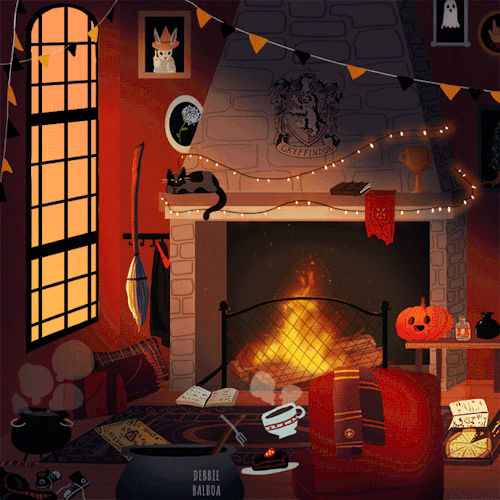
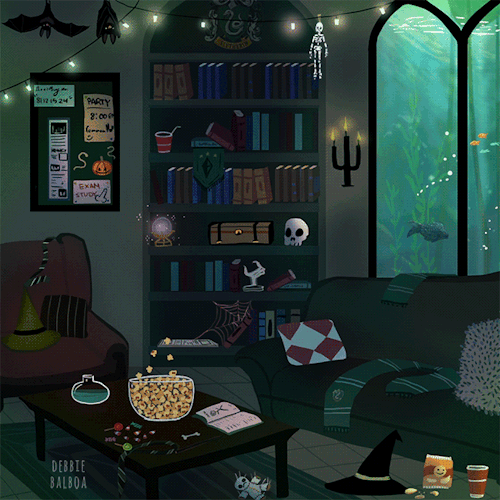
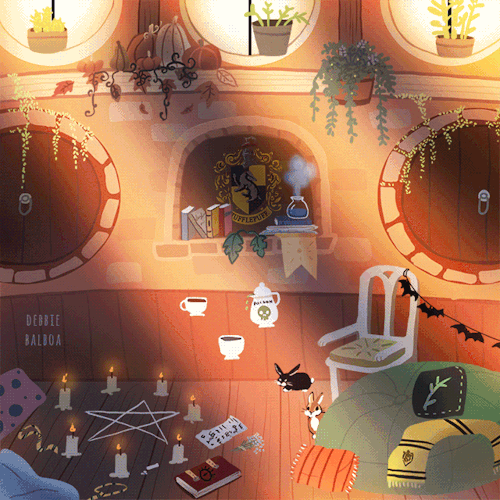
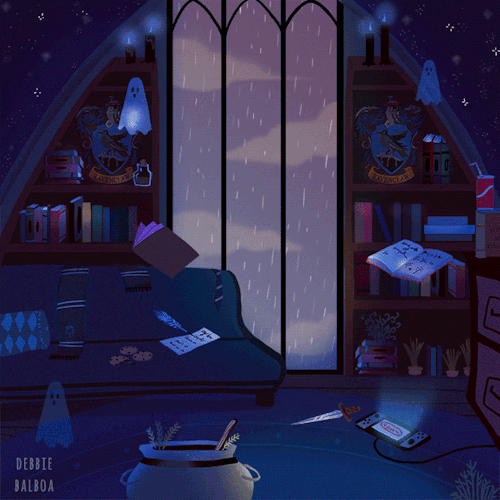
Hogwarts Houses common rooms in Halloween season
How to Deal with Study Burnout

As students in this day and age, it’s quite common for us to juggle rigorous academic responsibilities and overwhelming extracurricular activities. As a result, we might feel burnt out. But what exactly is burnout?
Burnout is when you feel physically and mentally exhausted as a result of constantly lacking the energy required to fulfill the demands of your studying.
Burnout can be broken down into three parts:
Exhaustion is what causes you to feel tired all the time and unable to concentrate. You could also get sick or have trouble sleeping.
Cynicism or depersonalization is when you feel disconnected from those around you, e.g. your friends and family.
Inefficacy is a decrease in productivity, efficiency, or quality of your work.
How do you know if you have burnout?
Symptoms may vary, but they include:
Being unable to absorb new information
Intellectual exhaustion
Decreasing academic performance and productivity
Feeling like you need to prove yourself
Making yourself work even more, even though you’re exhausted or being unwilling to study further
Neglecting your needs
Long term fatigue
Showing disinterest in things you normally enjoy, e.g. hobbies or friends
Denying that something’s wrong with you (may manifest in the form of aggression)
Avoiding social interaction
Feeling empty and depressed
What can I do to fix it?
Here are some short term solutions for dealing with burnout.

1. Take a power nap Power naps are life changing. They help you recharge your energy and get you ready to start working again. They also improve learning, memory, creativity, alertness, and mood. I would recommend napping for 30 minutes at most, because anything more will lead to a longer sleep session.
Optional: drink coffee before your nap - something that takes a short while to consume like a shot of espresso - so that you’ll feel alert and revitalized afterwards!
2. Take a shower A cold one will wake you up, but a warm one will calm you down. I suggest starting with warm water, then ending with cold water.
3. Exercise Whether it’s playing soccer or doing yoga, the important thing is to get moving! Exercise releases endorphins or happy hormones that help you combat stress.
4. Run a quick errand This will help take your mind off things while also getting something done! You’ll also end up walking, which is technically a form of exercise.
5. Call or visit a friend Sometimes what we’re lacking is social interaction, and hanging out with a friend definitely helps. Whether it’s providing you with a distraction or giving emotional support, your friends are always there to help you. Plus, science has shown that being with friends reduces your cortisol (stress hormone) levels.
6. Eat a snack Preferably a healthy one. Eat something with proteins, vitamins, and fibers to boost your mood. Here’s a list of mood boosting foods.
7. Surf the web This requires A TON of discipline, but it’s definitely a game changer. Surfing the web is one of the most relaxing things you could do. I personally look for a good laugh during my study breaks, so I’d watch a comedy or scroll through memes to get those happy hormones up and running.
8. Do an activity you find interesting, e.g. a hobby We all need happiness in our lives, and our hobbies are perhaps the best way to find that joy. You could sit down with a page turning adventure, or go outside and shoot hoops, or listen to a podcast, or even bullet journal, as long as you’re having a good time.
9. Listen to music Music is one of the ways we gain energy, so I always make time for it during the day. However, you should choose the right music, because not all the music you love is going to make you feel energized. For me, it’s pop punk with hard hitting beats, thundering guitars, and really upbeat, enthusiastic vocals. Some of you might be energized by mellow music with dreamy vocals that make you feel like you’re floating in the clouds. If you choose the wrong music, you might just end up feeling sluggish and drained.
10. Get some fresh air Your brain needs 20% of the oxygen in your body. Fresh air brings more oxygen to your brain so that you can think more clearly, feel less tired, and concentrate more easily.
How do I make sure I don’t get it in the future?
Avoiding study burnout in the long term has a lot to do with our study habits - as well as our daily habits. We need to make sure that our bodies and minds receive the things they need, and that we aren’t overworking them.

1. Study a little at a time Break up your notes into smaller, more easily digestible pieces and learn a little at a time. This way, you’re not overwhelming your brain, and you have time to let that new knowledge settle in.
2. Time management Having a good study schedule is crucial in preventing burnout. You don’t want to force yourself to work at your slow hours. Aside from that, you definitely shouldn’t leave things until the last minute, and sticking to a schdule will help you pace yourself. Here’s a post I wrote on How to Make an Efficient Revision Schedule and How to Beat Procrastination.
3. Get enough rest I cannot stress enough that sleep is so important for you. It improves your cognitive functioning and also enhances your mood, making it less likely that you’ll get burnt out. Make sure to take power naps, too, if you feel like you need them.
You also really shouldn’t pull all-nighters. Sleep is also involved in cementing memories in your brain, so if you study a little before you sleep, you’re bound to remember more than if you studied a chapter during an all nighter.
Having trouble sleeping? Here’s a post I made about my night routine and how to get better sleep.
4. Cycle your study environments Your body and mind are bound to get tired from being in the same location for prolonged periods of time. The best way to fix that is to study in different places: at your desk, your backyard, the dining table, a cafe, a friend’s house, the library, etc.You should find a frequency that works for you. I like to switch it up every 2-3 days; some people change locations every week.
5. Eat well As I’ve mentioned before, healthy foods with protein, vitamins, and fiber greatly improve your mood and your physical health. Proper nutrition will give your brain the power it needs to push through. Also make sure not to skip meals; honestly you’ll just end up feeling terrible afterwards.
6. Take frequent breaks Let’s face it, we’re human, we’re bound to get tired from studying for a long time. Taking breaks enables our brains to digest the information we just learned in a pace that works for it. Breaks also help us focus on something other than studying, so that when we do get back to it, we’ll be ready to digest even more information.
7. Set realistic study goals You’re gonna memorize all 500 pages of your biology textbook in one day? Good luck with that. Some of you might be compulsive studiers, but this kind of habit isn’t very good for your brain or your physical health. Studies have shown that excess studying can lead to lower productivity, fatigue, and - you guessed it - burnout. In the end, this will result in lower academic performance, perhaps even in the long run. So instead of trying to study so much in one sitting or one day, break up your material into chunks.
8. Maintain your social life Wherever you lie on the introvert-extrovert spectrum, everyone needs social interaction once in a while. It keeps you sane and healthy. Go out with your friends, have a sleepover, or maybe even a study date.
9. Start the day right What we do in the morning can significantly affect our mood for the rest of the day. Sometimes we don’t even feel like getting up in the morning, or doing anything that day. One thing you should do is create a morning routine you enjoy to jumpstart your day. Here are 8 Morning Habits for Productivity.
10. Think positive When we’re feeling burnt out, it’s hard to not think negatively about everything. In reality, that just makes our condition worse. So think positively! Start small, like congratulating yourself for getting out of bed today, and then work your way up to bigger accomplishments, like finishing 2 chapters of your textbook.
11. Keep a stress diary This is kind of a new concept for me, but it’s really great. How it works is that each day, you would write down all the things that made you stressed and how they made you stressed. This will help you identify the things you’re doing that’s causing your burnout, e.g.
Too long study hours? take regular breaks
Too much time in the same place? cycle your study environment
Not eating properly? set aside time to eat healthy meals at least 2 times a day
Not doing the things you love? schedule in time for that, e.g. during your long breaks
Not getting enough human interaction? make a study group
Too much negative thinking? adopt a positive mindset (you can always start small)
Not getting enough sleep? fix your sleep schedule
And that’s all I have for you guys this time. Hope these tips will help you manage your stress and study burnout whenever you have them. And if you have any questions, don’t hesitate to drop an ask!
P.S. if any of you want to see the images in this post in better quality, click here (link to google drive)
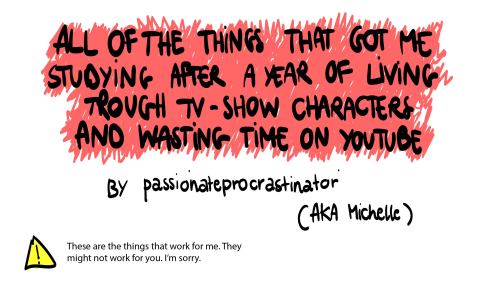
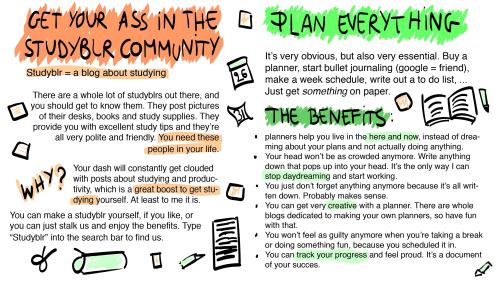

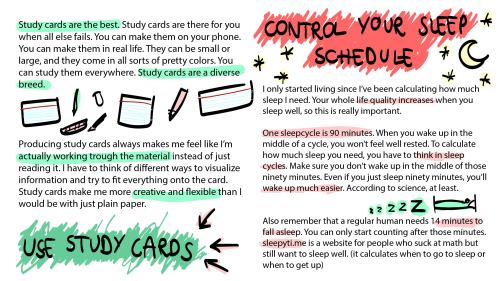
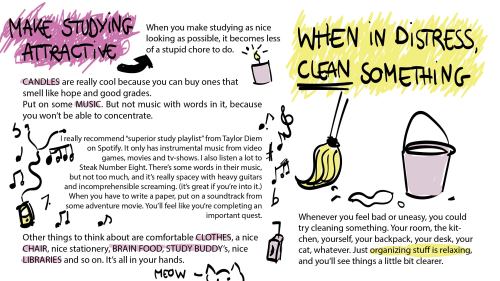


Urgh. Enjoy??? (I started making this six months ago so I’m obviously v productive) ✩✫✬✭✯✮✶✷
10 small tips to improve your productivity
Who can resist reading another little post full of tips to help you get more work done? Here is a few things that I find useful when trying to get myself motivated.
Clear desk, clear mind - I like to organise things before I start working. If things are messy, I get a little preoccupied and procrastinate even more. My suggestion is clear your desk, sort everything you’ll need to study and get on!
The two minute rule - If a task that needs to be done takes less than two minutes, just do it. My dad has often suggested that this is a great way to sort out your priorities and so far it has worked for me. Things like check my emails, cross off events from my planner, file something away don’t take long but get you in the mood for productivity. As they say “object in motion, stay in motion”.
Break your time up - Schedule your study time and any breaks you need to take. This helps structure your day and acts as a motivation to get things done. Especially if you can reward yourself at the end!
Leave your phone alone - Like most people I use my phone constantly but when I’m trying to work, it is best to leave it alone. Out of sight, out of mind. Try leaving it on silent and behind you so you aren’t tempted to pick it up after every beep. Use your break times to check it.
Find your top three to five priorities - Seeing a long list of things to do is usually, for some people, kind of counterproductive. Figure out the main things that need to be done and work on those. If you’re able to complete those main things, you’ll feel like you’ve accomplished the days necessities and may even want to complete some more.
Try using a mindmap instead of a to do list - Apparently using a mindmap layout instead of a traditional list can help boost productivity. It is a little more funky way to see all your outstanding tasks and might not look as overwhelming as a super long list.
Wear headphones - You don’t have to always listen to things but it can help block out any noise that can distract you. If you’re someone that likes some music, try songs with little or no words. This is a great playlist by Spotify.
Don’t multitask - As much as you think you can do it, trying to multitask usually ends up in a confused mess and takes twice the time. Stick to one task at a time. If you think of something you need to do, write it down and do it later.
Change things up - Doing the same things in the same place can get boring. Make the effort every now and then to change where you’re studying or how you’re studying. This can include moving your studying from the desk to the kitchen table for a change of scenery, or making flash cards instead of annotating your notes. Studying with a family member or friends is a fun way to get some work done!
Be positive - Most people have times when they just don’t want to study or anything, it is natural. However it is not worth sitting staring at your books in an unmotivated mood just waiting to feel inspired. If you’re not feeling it, do something else for a while. Come back to it a bit later and have another go. Usually walking away and coming back is all you need to feel more productive.
I hope these few tips are useful! These are the kind of things that work for me, so give them a shot and let me know if they help. Best of luck with your studies x
Teen French expressions
For if you want to make hip young friends.
Disclaimer: French people complain a lot. A lot. Don’t be surprised if 90% of these expressions are complaining.
Non mais oh - say this if someone does something mildly annoying and you want to express your shock and distaste.
Tu me fais chier - (alt. tu me fais chier, là.) literally ‘you make me shit’. means you’re pissing me off.
Carrément - translates to ‘squarely’. Means ‘literally’. If someone tells you something surprising or annoying, you can answer simply “ah carrément.” see: tu me fais carrément chier.
J’hallucine / je rêve - are you annoyed by something? say these.
C’est pas possible - a classic. anything bad happens - c’est pas possible. There is no cheese left? It’s not possible. I’m hallucinating. This is a burden on me that solely I can bear I cannot believe this is happening.
Ça commence à me gaver - I’m starting to get real sick of this. see: Ça commence carrément a me gaver là, putain.
T’es relou - verlan slang for ‘lourd’ meaning someone’s heavy, personality-wise. They’re tedious.
Ça me saoûle / ça me gonfle - similar to gaver, means something’s pissing you off, you’re sick of it.
Grave - totally.
C’est clair - totally/that’s clear. Like ‘claro’ in spanish. “Justine elle est trop relou” “C’est clair. Elle me fait chier.”
J’en ai marre - I’m sick of this.
J’en ai ras le bol - I’m sick of this.
J’en ai ras le cul - I’m sick of this (vulgar).
(J’en ai) Rien à battre - I don’t give a damn.
(J’en ai) Rien à foutre - I don’t give a fuck.
C’est bon, là. - That’s enough.
Perso, euh, - “Personally,” generally used at the start of a complaining sentence, to express how personal the matter is to you. Perso, euh, c’est bon là. J’en ai ras le cul.
Rôh là - general expression of distaste. Le longer the rôh, the more annoyed you are. Rôôôôôôôôôôôôôôôôôôôôôôôôôôôôh, c’est quoi ce bordel.
C’est quoi ce bordel ? - translates to “what’s this brothel”, means “what’s this shit?!”
C’est de la merde - It’s shit.
C’est une blague ? - Is this a joke?
Idem - ditto
J’ai la dalle - I’m hungry
Ça caille - It’s freezing
Ouf - two meanings 1. phew or 2. verlan for “fou”, meaning crazy (as a noun or adjective). “Kévin, c’est un ouf! Il fait du vélo sans casque!” “Ouais carrément, c’était un truc de ouf!”
Kévin - there’s a running joke that all the young delinquents seem to be called Kévin.
Crever - slang for “to die”. Va crever, connard!
Connard/Connasse - c*nt, but a lot less vulgar in french peoples eyes
And finally,
T’es con. No English translation can express the power behind the words “t’es con”. While it may sort of translate to “you’re a c*nt/idiot”, it expresses something much deeper. You really are a god damn fool.

Orange is the happiest color. 🍊🌺🍁 -Frank Sinatra

I miss you so much…😢 r.i.p. my endless love Loki ❤ (? - 2018)

Hi everyone it’s my first sharing and i’m so excited hope you like it 😊



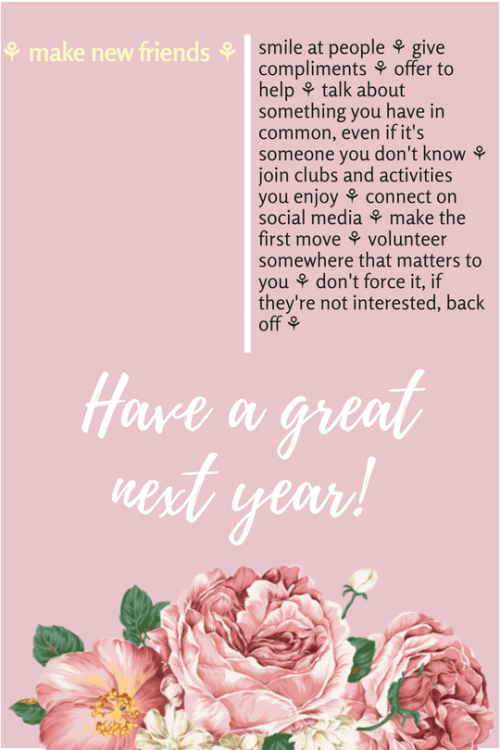
@rose-colored-studies
simple ways to a fresh start
• reorganize the furniture in your bedroom
• clean your room
• delete apps, contacts, etc from your phone that you no longer need or use
• change your phone wallpaper
• take your journal to a spot you’ve never been to around town // spend time reflecting while there
• sell or donate a few clothes you haven’t worn in a year (or even half a year)
• make a list of your goals // pin it to wherever you’ll see it most often to remind yourself where you’re headed
general study tips
this is just a quick list of study habits that work for me, as a straight a’s student
1. even if it’s not in your teacher’s presentation written on a slide, if you hear your teacher mention a fact, WRITE IT DOWN. you might need it later for a test.
2. when you’re rewriting your notes/compiling a study guide, pretend you’re making it for someone else. include everything, even if you think you know it. (unless you’re low on time, in which case, just write what you don’t know)
3. when you’re trying to learn a new concept, pretend you’re teaching it to someone else. this is a form of active learning, and the act of breaking the concept down into steps that you can teach will improve your understanding of the concept. (for the longest time, i actually didn’t even know this was an actual study technique, because i’ve always done it subconsciously!)
4. don’t over color your notes!! if you really need a key for all the colors, then you’re using way too many. try to stick with 2-3 pens/pencils. for me, i write most of my notes in black ink or pencil and i write the important concepts i might need to find quickly later (such as vocabulary) in red or blue pen.
5. have your water bottle next to you (so you remember to stay hydrated; this makes focusing easier as well), as well as any other things you might need during a study session so you don’t have to keep getting up to get stuff (which is pretty distracting for me as i’m easily sidetracked).
6. make it a habit to write lists of everything you need to do by the end of the weekend (or the end of that day, depending on how much work you have). this’ll help you familiarize yourself with your tasks so you have a clear plan of what needs to get done.
7. (not really necessary, just something i like to do!) learn to eat with your non-dominant hand so you can eat and take notes and turn pages w/out ripping them instead of scrolling through social media. keep in mind that sometimes, meal times are for taking your mind off school so unless you’re really pressed for time, it’s not a huge deal if you spend this time w/passive reading, texting friends, etc.
8. when you’re assigned a research project, COME UP WITH A THESIS FIRST so you know what to research. try to get all your research done within the first two days or so, to have more time to plan out how you’re going to structure it. then get your draft done (something is better than nothing) so you can revise at your own pace instead of rushing at the last minute.
9. prioritize your homework!! as someone who spends hours fencing and even misses school for fencing tournaments, is part of symphonic band, and on the robotics team (build season is suuuuuper busy), i can’t express how important this is!! if you have math first period, get that done first, whereas if you have math last period, you can do it at lunch and spend your time working on something that’s due in the morning. don’t do this all the time, but if you need to, know which teachers are more strict with due dates so if you really do need an extension, you’ll be asking the least strict teacher and will have much better chances of getting said extension.
10. if you study at home like me, change into new clothes (comfy clothes, but not pajamas) before cracking open your textbooks. it’ll help make you feel more refreshed and ready to start your homework, but not confined to uncomfortable uniforms from school. tie up your hair, if it’s long. try to study at a table/desk rather than in bed (for sleeping not studying) or on the floor (bad for your posture).
11. check out this post for productive things you can do when you aren’t studying, but still want to be productive!
hope these helped some of you!!
xoxo, ren





Good luck! (ᵔᴥᵔ)

I believe in free education, one that’s available to everyone; no matter their race, gender, age, wealth, etc… This masterpost was created for every knowledge hungry individual out there. I hope it will serve you well. Enjoy!
FREE ONLINE COURSES (here are listed websites that provide huge variety of courses)
Alison
Coursera
FutureLearn
open2study
Khan Academy
edX
P2P U
Academic Earth
iversity
Stanford Online
MIT Open Courseware
Open Yale Courses
BBC Learning
OpenLearn
Carnegie Mellon University OLI
University of Reddit
Saylor
IDEAS, INSPIRATION & NEWS (websites which deliver educational content meant to entertain you and stimulate your brain)
TED
FORA
Big Think
99u
BBC Future
Seriously Amazing
How Stuff Works
Discovery News
National Geographic
Science News
Popular Science
IFLScience
YouTube Edu
NewScientist
DIY & HOW-TO’S (Don’t know how to do that? Want to learn how to do it yourself? Here are some great websites.)
wikiHow
Wonder How To
instructables
eHow
Howcast
MAKE
Do it yourself
FREE TEXTBOOKS & E-BOOKS
OpenStax CNX
Open Textbooks
Bookboon
Textbook Revolution
E-books Directory
FullBooks
Books Should Be Free
Classic Reader
Read Print
Project Gutenberg
AudioBooks For Free
LibriVox
Poem Hunter
Bartleby
MIT Classics
Many Books
Open Textbooks BCcampus
Open Textbook Library
WikiBooks
SCIENTIFIC ARTICLES & JOURNALS
Directory of Open Access Journals
Scitable
PLOS
Wiley Open Access
Springer Open
Oxford Open
Elsevier Open Access
ArXiv
Open Access Library
LEARN:
1. LANGUAGES
Duolingo
BBC Languages
Learn A Language
101languages
Memrise
Livemocha
Foreign Services Institute
My Languages
Surface Languages
Lingualia
OmniGlot
OpenCulture’s Language links
2. COMPUTER SCIENCE & PROGRAMMING
Codecademy
Programmr
GA Dash
CodeHS
w3schools
Code Avengers
Codelearn
The Code Player
Code School
Code.org
Programming Motherf*?$%#
Bento
Bucky’s room
WiBit
Learn Code the Hard Way
Mozilla Developer Network
Microsoft Virtual Academy
3. YOGA & MEDITATION
Learning Yoga
Learn Meditation
Yome
Free Meditation
Online Meditation
Do Yoga With Me
Yoga Learning Center
4. PHOTOGRAPHY & FILMMAKING
Exposure Guide
The Bastards Book of Photography
Cambridge in Color
Best Photo Lessons
Photography Course
Production Now
nyvs
Learn About Film
Film School Online
5. DRAWING & PAINTING
Enliighten
Ctrl+Paint
ArtGraphica
Google Cultural Institute
Drawspace
DragoArt
WetCanvas
6. INSTRUMENTS & MUSIC THEORY
Music Theory
Teoria
Music Theory Videos
Furmanczyk Academy of Music
Dave Conservatoire
Petrucci Music Library
Justin Guitar
Guitar Lessons
Piano Lessons
Zebra Keys
Play Bass Now
7. OTHER UNCATEGORIZED SKILLS
Investopedia
The Chess Website
Chesscademy
Chess.com
Spreeder
ReadSpeeder
First Aid for Free
First Aid Web
NHS Choices
Wolfram Demonstrations Project
Please feel free to add more learning focused websites.
*There are a lot more learning websites out there, but I picked the ones that are, as far as I’m aware, completely free and in my opinion the best/ most useful.




Paolo Sebastian spring 2017 couture








Beautiful,The Arabian 1002th Night Guo Pei Haute Couture show 2010

Nicole Miller Spring 2019
Totally right 👌😂

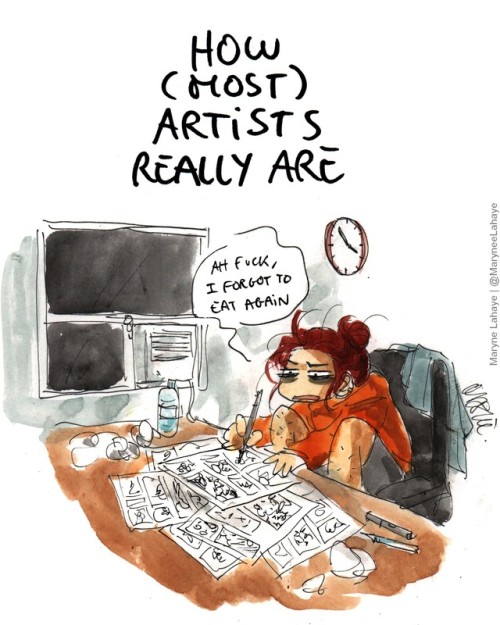
lively and ethereal people VS sleep deprived creatures of the night
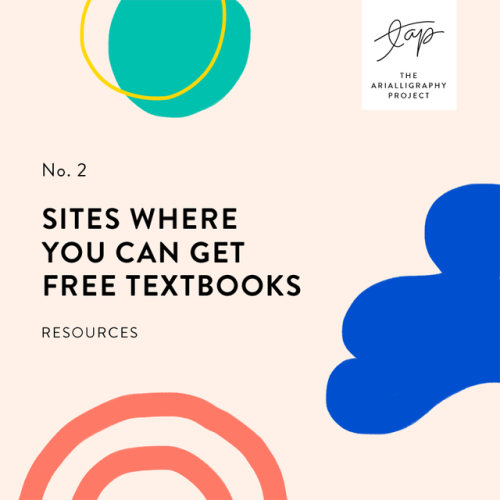
Press Ctrl+F or ⌘F to do a quick search!
bookboon // for accounting, business, economics & finance, engineering, IT & programming, languages, marketing & law, natural sciences, statistics & mathematics (+ career & study advice, strategy & management)
booksee // for arts & photography, biographies & memoirs, business & investing, computers & internet, cooking, entertainment, health, history, home, law, literature & fiction, medicine, references, religion, science, sports, travel, and other categories
bookstacks // for popular classics
boundless // for accounting, algebra, art history, biology, business, calculus, chemistry, communications, computer science, economics, education, finance, management, marketing, microbiology, music, physics, physiology, political science, psychology, sociology, statistics, U.S. history, world history, writing
california learning resource network // for mathematics, science, history
ck-12 // for elementary math, arithmetic, measurement, algebra, geometry, probability, statistics, trigonometry, analysis, calculus, earth science, life science, physical science, biology, chemistry, physics, sat exam prep, engineering, technology, astronomy, english, history
Keep reading
Real talk tips for studying
1. Get up early.
I know, it’s easier said than done. But it is going to be hard for the first 15-20 minutes, maybe even the first hour, but make yourself some coffee, and get the fuck out of that bed.
2. Do 3 useful things right after you get up.
This doesn’t have to be ‘cram one lesson’ or ‘take 500 pages of notes’. No. Brush your teeth, make yourself something nice to drink, comb your hair. Wash your face. Literally whatever you find useful, do it. It may take 10 minutes, but you will feel instantly better when you see you’ve done something.
3. Organize your study space.
I don’t mean organize all your highlighters by color. I mean arrange everything so it is within your reach. That means when you sit down to finally study, there won’t be any need for you to get up and get something.
4. Take breaks.
It’s easy to start scrolling through instagram, or facebook when you sit by a 200 page book. Trust me on this. But set an alarm when you plan on taking a break. Make the break your instagram time, or facebook time, or just chill time. Whatever you do, organize your time so you don’t leave anything out.
5. Divide your shit.
So you have a 300 page chapter to read. Or a 30 page paper to write. Divide it into smaller parts. For example, I will read through the first 30 pages and then take a break. Repeat. Or, I will write 3 pages and then relax. Repeat. Literally whatever shit you have, divide it into smaller chunks and then just tackle the chunks.
6. Don’t listen to music with lyrics.
There are a ton of ‘study music’ or ‘motivational music’ playlists on Youtube. Blast that. That way, you won’t find yourself mouthing the perfect lyrics to Shape of you, and not knowing shit about what you’ve been reading. I’ve been there one too many times and it’s just wasting time.
7. Don’t feel bad about not responding to texts, or not hanging out with friends.
There is time to study and time to play. No between. By all means you should go out and have fun. But your work time can only be your work time. That text can wait, that coffee date can wait. During the break you will have more than enough time to catch up. And your friends should understand that, after all, this is important to you so it should be for them too.
8. Drink water! ! !
This is the most used tip, but trust me, you get tired much quicker if you’re not hydrated. Get a nice ass bottle of water and fill that shit up. Everytime you finish a paragraph take a sip. (At least!)
9. Don’t worry too much.
I’ve lost countless hours by panicking and trying to reason with myself why I should just quit. And let me tell you, it’s very easy to get stuck in that vicious circle. But when you begin to worry, take a deep breath, drink some water and just do. Read that sentence. Write the opening line to your paper. Underline that unknown word. Just do. It will not go in vain. No effort is ever useless.
10. Relax.
You are not the first one to have trouble with this. You are not the only one struggling with this material. But you can do it. It is possible. In 10 years you won’t remember that godawful task or chapter. But you will remember taking shit into your hands. And that feeling when you accomplish your goal is going to be worth all the while.
That’s about it, worked for me. Just be real with yourself. Good luck and may the odds be ever in you favor!

Gemma Ward @ Alexander McQueen Fall 2006

Backstage at Ralph & Russo Spring 2017 Couture

FALL 2018
COUTURE
Guo Pei






ziad nakad fw 17-18